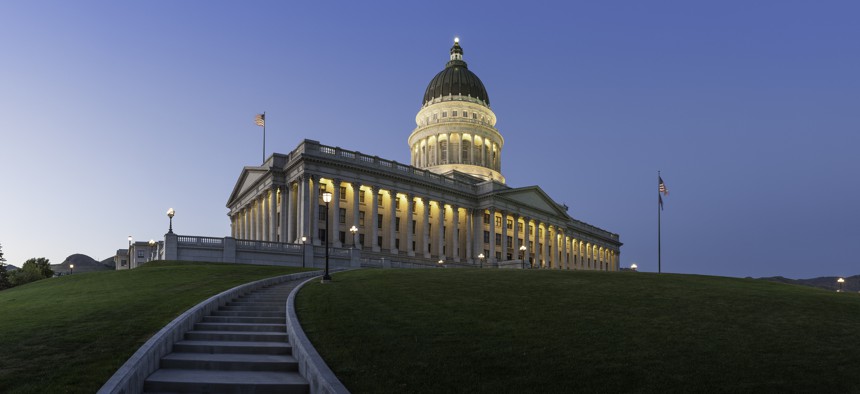States push ahead with social media laws amid legal challenges

The Utah State Capitol. Lawmakers in the state are delaying the implementation of its social media rules in the face of pending litigation. fotoVoyager/Getty Images
Utah delayed its efforts for litigation purposes, while a judge blocked an Ohio law. But that hasn’t stopped other states, most recently Idaho and New York, from introducing their own restrictions to protect minors.
Despite a string of lawsuits challenging several states’ social media restrictions for minors, many others are trudging ahead, seemingly undeterred, with their own legislation.
Even Utah, which faces several lawsuits that argue the state’s social media law is unconstitutional, appears defiant. While Gov. Spencer Cox signed a bill last week that will push back implementation of the state’s Social Media Regulation Act from March 1 to Oct. 1, he was careful to stress that Utah was “as committed as ever to protecting our children from the harms of social media.”
State Sen. Kirk Cullimore, who sponsored the original law, told the Utah News Dispatch that the law Cox signed was merely for litigation purposes. Just a week before it passed in the legislature, Republicans had vowed to prioritize revisions to ensure its social media laws held up in court.
In his speech to mark the start of the new legislative session, Utah Senate President J. Stuart Adams said lawsuits would not halt their mission.
“We will continue leading the nation in protecting kids against social media,” Adams said. “We will hold social media companies accountable for the harm they are inflicting upon our youth. And we will stand for our children and proudly fight the litigation.”
Utah’s restrictions require social media platforms to verify users’ ages, get parental permission before minors’ use their apps and provide a way for parents to control the content their child views, among other rules. Critics have previously questioned the effectiveness of such legislation, and whether privacy protections would be undercut by them.
The lawsuits challenging Utah’s restrictions argue that the Social Media Regulation Act violates residents’ First Amendment rights to share and receive information online, and also violates the Constitution’s Supremacy Clause as it conflicts with federal law.
In the lawsuit filed by NetChoice, the open internet advocacy group said the action was necessary to protect residents’ constitutional protections online, protect the privacy of their data and “keep parents in charge of their families—not big government.”
Chris Marchese, director of the NetChoice Litigation Center, said in a statement the lawsuit is a way of “fighting to ensure that all Utahns can embrace digital tools without the forceful clutch of government control.”
A separate lawsuit by a current Utah high school student and three adults, represented by the Foundation for Individual Rights and Expression, makes similar arguments. That suit accuses Utah legislators of choosing to “default to censorship,” rather than explore social media’s effects on young people.
Similar legislation in Ohio has run into legal issues too. The state’s Social Media Operators Act passed the general assembly last July and was due to take effect on Jan. 15. The legislation requires social media platforms to get parental consent before accounts can be created for children under 16, and must offer parents tools to censor or moderate inappropriate content.
Upon consent, platforms must then send written confirmation of a child’s account to their parent or guardian. Where notification is not provided by the companies or if a parent or guardian wants to terminate their child’s access, the company has 30 days to close the account. If they do not comply, parents or guardians could file a complaint with the Ohio attorney general.
However, a U.S. District Court granted a NetChoice request to temporarily block the law from going into effect while a larger lawsuit the group brought against it is heard. Ohio Gov. Mike DeWine said in a statement he was “disappointed” about the temporary injunction and will continue to push for its implementation as “parents should have a role in their children’s social media use.”
The legal jeopardy of the Utah and Ohio laws, as well as the temporary blocking of Arkansas’ social media regulations, has not stopped others from copycat rules amid what looks to be a crucial year for such restrictions.
During his State of the State address earlier this month, Idaho Gov. Brad Little urged legislators to pass “meaningful reforms” in this legislative session “to better protect our children from the harms of social media.” Little echoed the findings of U.S. Surgeon General Dr. Vivek Murthy, who last year blamed social media for its impact on youth mental health.
“Social media is addicting,” Little said in his speech. “It creates a forum for cyberbullying. It replaces quality time with kids’ friends and loved ones, and it makes them compare themselves to impossible, artificial standards for looks and lifestyles.”
New York is also considering bills to regulate children’s social media use, which were first announced last year. Both the Stop Addictive Feeds Exploitation for Kids Act and the New York Child Data Privacy and Protection Act are currently in committee.






